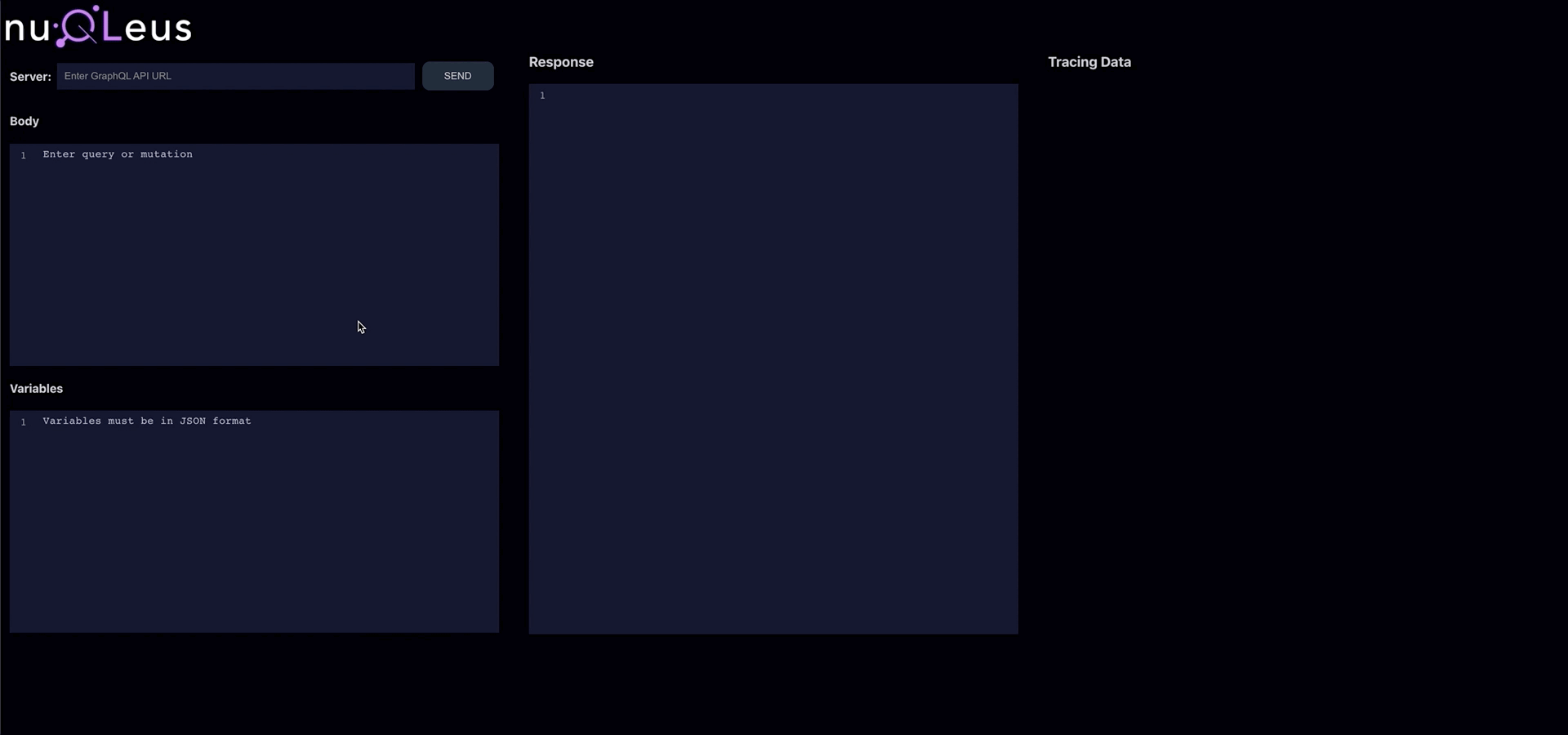Boost GraphQL endpoint testing capabilities with resolver-level performance metrics.
- Description
- Motivation
- Features
- Getting Started with nuQLeus
- Technologies
- Contributing
- Areas for Improvement
- Authors
- License
- Links/Contact
NuQLeus is a lightweight, self-contained, GraphQL endpoint testing GUI that extracts resolver-level tracing performance metrics from GraphQL queries and mutations and allows an enduser to easily identify specific resolvers that are having a detrimental impact on application performance.
- There is a considerable amount of overhead associated with building out a GraphQL API for the first time.
- GraphQL APIs can be created using a multitude of different libraries such as Apollo Server and Express-GraphQL.
- The library that is selected to build a GraphQL API can limit what features and metadata are accessible.
The motivation for nuQLeus stems from the fact that there are a multitude of different libraries, each with varying sets of features, that can be used to implement a GraphQL API. The library that an enduser selected when first creating a GraphQL API can limit which metadata they will have access to; for example, GraphQL APIs setup via Apollo Server have access to resolver-level tracing metrics whle servers created with Express-GraphQL will not. nuQLeus seeks to help bridge this feature gap and enable an enduser to extract resolver-level tracing data from queries and mutations, regardless of which server they used to initially create their API.
- Simulate GraphQL queries and mutations in the nuQLeus environment
- Real-time tracing durations at individual resolver-level for GraphQL queries and mutations
- Processing and visualization of tracing data to help identify performance drop-offs at a glance
npm install --save-dev nuqleusThe Apollo Server constructor function accepts an object with properties that convey schema options. Simply pass the existing options object into the nuqleus.ApolloWrapOptions method to return a new options object to be passed into the ApolloServer constructor.
const { ApolloServer } = require('apollo-server');
const connectDb = require('./config/db');
const typeDefs = require('./types');
const resolvers = require('./resolvers');
const models = require('./models');
import nuqleus from 'nuqleus';
connectDb();
// 1. Define your context either as an object or function //
// Add your models in here, if any //
const userContext = {
models,
sampleObject: {},
};
// 2. Define your formatResponse, if any, as an object //
const userFormatResponse = {
formatResponse: (res, reqContext) => {
res.http = {
someUserHttp: {
startTime: new Date().toISOString(),
endTime: new Date(Date.now()).toISOString(),
}
};
}
};
// 3. Create a nuqleusServerObject using the ApolloWrapOptions method //
// Allowable inputs: typeDefs, resolvers, context, formatResponse, ...resolverInputs //
const nuqleusServerObject = nuqleus.ApolloWrapOptions(
typeDefs, resolvers, userContext, userFormatResponse
);
/**
* If any resolverInputs will be inputted, they will be wrapped after
* the nuQLeusTraceResolver around your schema with the applyMiddleware method.
*
* const schemaWithMiddleWare = applyMiddleware(clientSchema, nuqleusTraceResolvers, ...clientInputs);
*/
// 4. Spread the nuqleusServerObject into your new ApolloServer instance //
// If you have any add'l options, add them in after
const server = new ApolloServer({
...nuqleusServerObject,
// add'l user options,
// add'l user options,
});
// 5. Run your server /
server.listen(4001).then(({ url }) => {
console.log(`🚀 Server ready at ${url}`);
});Express-graphql's graphqlHTTP function accepts an options parameter that can either be an object or a function. Simply pass existing options into nuqleus.WrapOptions function to return a new options callback to pass into graphqlHTTP.
If users have extensions, simply pass the extensions callback into nuqleus.WrapOptions as a second optional argument.
const express = require('express');
const { graphqlHTTP } = require('express-graphql');
const schema = require('./schema');
const models = require('./models');
const nuqleus = require('./nuqleus');
const extensions = ({ document, variables, operationName, result, context }) => ({
hello: context.hello,
});
const options = {
schema,
context: { models, hello: 'world' },
graphiql: true,
};
const newOptions = nuqleus.WrapOptions(options, extensions);
app.use('/graphql', graphqlHTTP(newOptions));
app.listen(4000, () => {
console.log('Listening on port 4000');
});The nuQLeus wrapper methods instantiate a server and serve the nuQLeus GUI whenever a user's GraphQL server is initialized. In order to access the nuQLeus GUI, navigate to http://localhost:3030/nuqleus while your server is running.
- GraphQL
- React
- Codemirror
- Graphql-middleware
- Victory
- Express & Node.js
- Jest
- Supertest
- Enzyme
- Webpack
- MongoDB
Development of nuQLeus is open source on Hithub through the tech accelerator umbrella OS Labs. We are grateful for the community's contribution to the project. Please read the contribution documentation to learn more on how you can participate in improvements.
- Functionality
- Include additional GraphQL servers into nuQLeus coverage
- Ex. graphql-yoga or graphql-helix
- Add tracing capability for GraphQL subscriptions
- Set up a database to store historical user inputs and results
- Allow performance metric comparisons between past and present queries and mutations
- Alternatively, use localStorage for comparisons
- Add onChange user input checks so only valid body/variables can be submitted
- Add introspection capability for users to break down their schemas/queries/mutations in the frontend
- Include additional GraphQL servers into nuQLeus coverage
- UI/UX
- Use React Router (or other method) to show multiple windows in the
- Include additional visualizations of relevant information users may find helpful
- Convert the Victory graph library to a more widely-used alternative such as D3
- Code Base
- Convert .js and .jsx code to .ts and .tsx
- Implement CORS policy in wrapper for pre-set headers
- Prevent the need for users to have to install and enable CORS
- Refactor and improve code as seen



